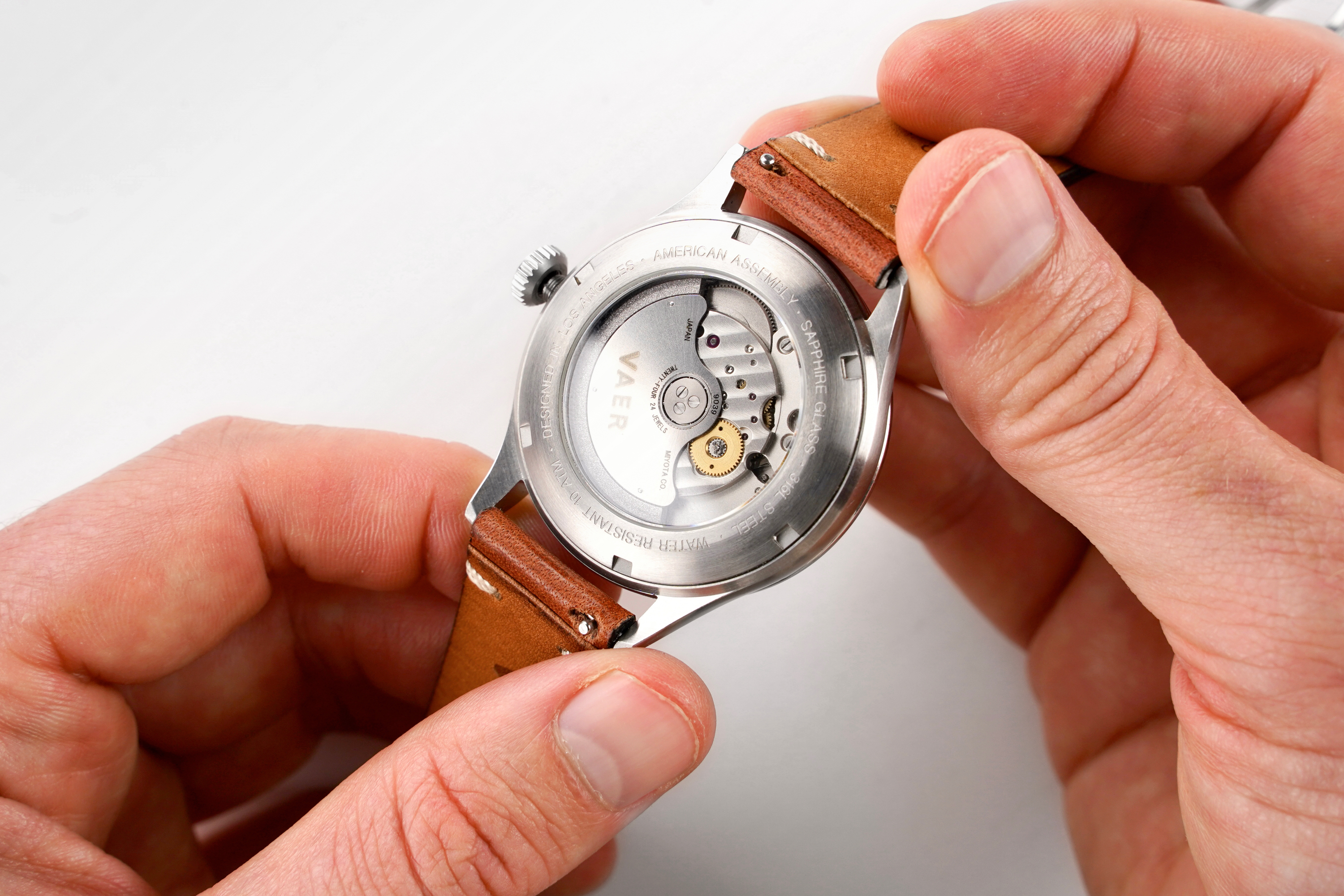Quartz vs. Automatic Watches - What's the difference?
 Updated
by Vaer Watches
Updated
by Vaer Watches
Quartz watches are battery-powered, automatic watches are battery-free and use kinetic energy to keep time.
Since as early as 2000 BC, humans have built and used a variety of tools in order to keep track of time. Prior to modern clocks, tools ranged from obelisks to track the movement of the sun, water clocks, candle clocks, hourglasses, and a number of other machines. While the history of timekeeping instruments alone could fill a book, we're going to jump right into a quick explanation of quartz and automatic movements.
In order to set the stage, it's important to know that a "watch movement" is the component within the watch that keeps time and powers the watch's hands - it can be thought of as the engine.
- Reagan Cook, Vaer Co-Founder
Quartz Movement Watches
Quartz movements were first invented in 1927, and brought to the consumer market in watches in the late 1960s. While once seen as the pinnacle of timekeeping technology, they're now readily available around the world. They're battery-operated, incredibly accurate, and very affordable.

Automatic Movement Watches
Automatic movements are an older technology than quartz movements, but they're still often used in watches because they carry a different degree of quality, craftsmanship, and complexity. Instead of batteries, they run off of energy from a wound spring - this spring stores energy and distributes it through interconnected gears and springs, controlling the supply of energy to power the watch. The mainspring is "charged" either through hand-winding or natural motion generated from user wear. In the case of charge through user wear, a rotor, driven by the motion of the wearer's arm, charges the spring. We're excited to release an automatic watch line in order to incorporate this side of the watch world into our lineup.
Are Automatic Watches Objectively Better Than Quartz Watches?
While you may see this opinion in watch forums and comment sections, the short answer is... no! The go-to assumption for many consumers is that an automatic watch is simply "better" than all quartz watches because of it's complexity, craftsmanship, and cost. Ultimately, though, it all comes down to consumer preference and needs.
While most automatic watches may carry more mechanical complexity and cost significantly more than most quartz watches, they’re also less accurate by nature of the design. While mechanical movements generally have an accuracy of +-10 seconds to +- 30 seconds per day, a quartz movement will have this same accuracy range (or better) over the course of an entire MONTH. For those that are in the pursuit of ultimate timekeeping precision, a quartz watch is going to be the clear choice.
Automatic watches also run on a "power reserve", which is essentially the amount of time the watch can continue to operate off the power generated by the winding of the movement. Most watches come in around a 40-hour reserve, which means that if the watch is not wound or worn for 40 hours, it will stop, therefore losing track of the time. A quartz movement, on the other hand, continues to tick as long as a battery is active - in our watches, this is 3-4 years per battery. Again, if you're looking for a reliable timekeeping instrument that keeps time without regular wear, then an automatic may not be the best choice.

Despite the above, automatic watches are incredible feats of human engineering that deserve all the praise that they get. It’s a magical thing to know that there is a machine on your wrist being powered by nothing more than natural motion. A machine that is capable of tracking time with micro gears and springs without the use of electricity is a fantastic thing. There’s also something to be said for the fact that an automatic watch is entirely “off the grid”. There are no batteries to die or satellites to connect to – it’s physical components working in perfect harmony to produce accurate time - this is amazing.
The movements used in Vaer mechanical watches will all be powered off of both hand-winding, as well as natural motion. In the case of natural motion, the energy generated by your motion is harnessed by a rotor in the watch movement, then stored in the mainspring.
Is Quartz or Automatic Right for You?
We say both, each for different occasions!
- Ryan Torres
Sometimes you may want a watch that you can just set and forget. If you want to be confident that the time is going to be accurate when you haven't worn your watch in a week, quartz is going to be the choice. Due to the lower cost of a quartz movement, your quartz watch may also be the choice for situations where damage or loss may occur.
Other times, you may want to feel the weight of an automatic watch, knowing that it houses a beautiful machine right on your wrist. You may love having the ability to look down at that sweeping second hand and to be able to flip the watch over and see the inner workings of the movement through an exhibition caseback - in this case, an automatic would be the clear choice.
